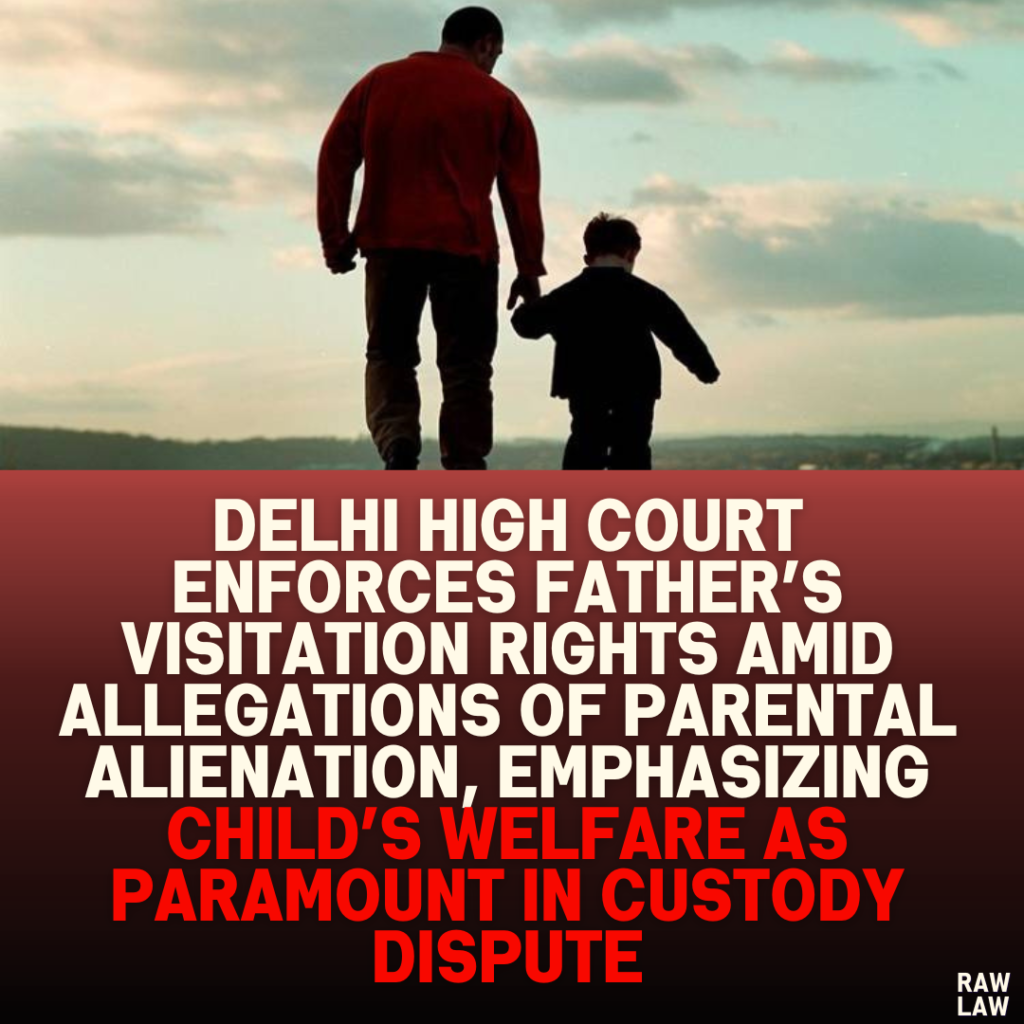Court’s Decision
The Delhi High Court ruled in favor of enforcing the petitioner-father’s visitation rights with his minor son, emphasizing that the child’s welfare and psychological well-being are paramount. The court provided a structured visitation schedule, appointed a counselor to ensure compliance, and highlighted the adverse impact of parental alienation on the child.
The court stated, “The child deserves love, care, and attention from both parents,” and warned that continued obstruction of visitation would not be tolerated.
Facts
- The petitioner-father filed a writ of habeas corpus, seeking custody of his minor son, alleging that the mother was obstructing his visitation rights as previously directed by the courts.
- Despite clear orders from the family court, the Delhi High Court, and the Supreme Court, the mother allegedly failed to facilitate the father’s access to the child.
- The petitioner claimed that the child was being alienated against him and the paternal family, resulting in emotional and psychological harm to the child.
Issues
- Was the petitioner-father’s visitation rights being deliberately obstructed by the mother?
- Did the alleged parental alienation adversely affect the child’s emotional and psychological welfare?
Petitioner’s Arguments
- The father argued that despite repeated court orders, the mother was creating hurdles in implementing the visitation schedule.
- He emphasized the child’s need for a balanced relationship with both parents for healthy emotional development.
- The father requested a revised visitation schedule, including overnight stays every weekend, and sought the court’s intervention to prevent further alienation.
Respondent’s Arguments
- The mother contended that the child was unwilling to visit the father, citing incidents where the child locked himself in the car to avoid interaction.
- She argued that her actions were in compliance with the court’s orders and that any delays or disruptions were unintended.
Analysis of the Law
The court analyzed key legal principles surrounding custody and visitation:
- Best Interest of the Child: The welfare of the child is the primary consideration in custody disputes, including ensuring emotional stability and relationships with both parents.
- Parental Alienation: Alienating a child against one parent is harmful to the child’s development and contrary to the principle of co-parenting.
- Enforcement of Court Orders: The court emphasized that disobedience of judicial orders undermines the legal system and the child’s welfare.
Precedent Analysis
The court referred to V. Anusha v. B. Krishnan, where the Madras High Court condemned parental alienation, noting its damaging effects on children. That case highlighted:
- A parent’s duty to foster positive relationships with the other parent.
- The necessity of healthy co-parenting to prevent long-term psychological harm to children.
- The court’s responsibility to intervene in cases where one parent undermines the other’s relationship with the child.
Court’s Reasoning
- Parental Alienation: The court found credible evidence of parental alienation, noting that the child’s reluctance to visit the father appeared to be influenced by the mother’s actions.
- Counselor’s Report: The appointed counselor’s report revealed that the child was emotionally distressed and required play therapy to cope with the situation. It also highlighted the need for both parents to avoid negative behavior and work collaboratively for the child’s well-being.
- Repeated Non-Compliance: The court observed that the mother had repeatedly failed to comply with previous visitation orders, despite explicit instructions from the Supreme Court and High Court.
- Balanced Parenting: The court stressed that depriving the child of a relationship with either parent could lead to long-term harm, emphasizing the importance of balanced parenting.
Conclusion
The court issued the following directives:
- Revised Visitation Schedule: The child was to spend specific weekends and holidays with the father, with the father’s parents acting as primary caregivers during these periods.
- Counselor’s Involvement: The court appointed a counselor to facilitate the child’s transportation and ensure a stress-free visitation process. The counselor was directed to submit reports on the child’s emotional and behavioral progress.
- Daily Communication: During the father’s visitation period, the child was to have daily video or phone calls with the mother for 15 minutes to maintain a sense of continuity.
- Future Compliance Review: The matter was scheduled for further review on January 21, 2025, to assess compliance and address any new issues.
Implications
The judgment reinforces the judiciary’s commitment to safeguarding the welfare of children in custody disputes. It highlights the following principles:
- Parental alienation is detrimental to a child’s well-being and will not be tolerated by the courts.
- The judiciary prioritizes the enforcement of visitation rights to ensure that children benefit from the presence of both parents in their lives.
- Co-parenting is essential for a child’s healthy development, and parents must collaborate to provide a stable and supportive environment.
